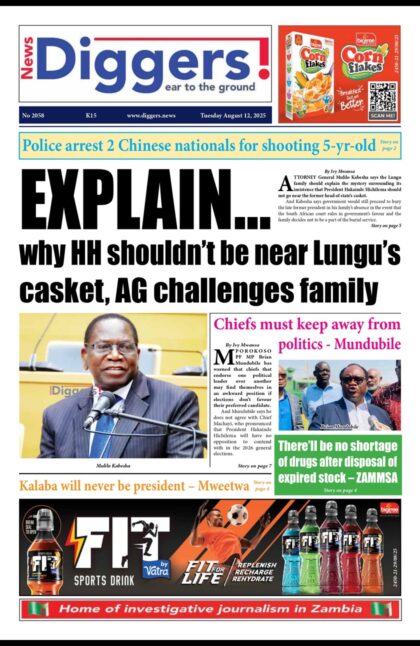Economist Professor Oliver Saasa has warned that the country will be killing the ‘goose that lays the golden egg’ if government does not come up with a friendly and well consulted mining tax regime for the 2020 national budget.
And the Professor has advised that the VAT system must be perfected and maintained as opposed to introducing the sales tax regime in the coming fiscal year.
In an interview, Professor Saasa noted that there was need for stability in the mining sector in terms of the tax regime.
“When you look at the fiscal tax regime, we have actually killed or are in the process of killing the goose that lays the golden egg. The tax that has been introduced in the mining sector, much as there is what you can probably call resource nationalism, I think we have to be vigilant at that level but we have to also know that actually mining is a very high capital intensive undertaking that requires some level of stability. That stability comes with the responsible fiscal regime. Look at actually what has happened, in the last 16 years, we have changed the focal regime in the mining sector, the tax regime changed 10 times. In 2015 alone, we actually changed the fiscal regime twice within the same year because firstly, we do not listen and we do not have a proper system of consulting the mines and professionals as to what works,” he said.
“So you have to balance out, are they well meaning, is their logic making sense, to what extent do we protect the interests of Zambians, how can we protect them into making sure that the mines, while we actually controlling them, they are actually still, given the latitude to be able to reinvest, at the moment, they cannot reinvest. If you listen to the arguments they are putting up and they are very legitimate, we are killing investment opportunities. Three quarters of the mining houses if not more have suspended already approved expansions and that is not good for us. So if there is one area where we need to focus on is on that.”
He also warned against increasing tax to fix erring companies instead of correcting the monitoring mechanisms that have loopholes.
“I think we all agree that there must be fairness especially with respect to investors that come to Zambia to meet their tax obligations. Where our systems are found wanting in terms of ensuring that there is tax compliance, what usually you do is not to increase the tax. Tax compliance, you do not correct it by increasing the tax responsibility, you correct it by looking at systems of oversight, systems of monitoring, systems of reporting that are within the pay view of government, you have to ensure compliance by making sure that everybody who is expected to meet their obligations in terms of corporate tax, they pay. If they fail to do so, they should be well clearly specified litigation and punishment,” he stated.
“If there is an accusation that some mining companies, mining houses are not paying tax, you do not punish them by increasing the tax so that your share is better, because that might be the logic. ‘If you are getting illegally, let us tax you more so that we get our share’, that is not how it works. If somebody transgresses, there are two things, firstly prosecute them, secondly, if you assume that these people are too crafty, then improve upon your systems of monitoring to ensure that no transgressions are committed or transgressions are maintained to the barest minimum.”
And Professor Saasa has advised that the VAT system be perfected and maintained as opposed to introducing the sales tax regime in the coming fiscal year.
“I am very happy with the honourable Minister of Finance who withdrew the bill (Sales Tax) and said we are going to discuss it and then introduce it in 2020. My view is that there is an opportunity for him to listen to what the industry is saying, government has given itself an opportunity to rethink about this whole thing but I will be one of the happiest people if I will hear that we just have to perfect VAT as it presently is. When you look at the past, yes it has had some major challenges like the vat refunds, you must find ways of perfecting it. Almost all the major mining companies in the world have been affected where and whenever you are migrating from VAT to sales tax,” he explained.
“Many countries in the world have moved from sales tax just like we did to VAT and there is no reason whatsoever unless actually the ZRA can come up with a clear argument, am not convinced. I have listened to them talking, I have listened to the Commissioner General talking, I do not believe that the arguments are sufficiently convincing. My proposed view is that we need to discuss this further, if at all we must consider it, it should be way beyond 2020, and that we should retain the VAT in my view.”
























